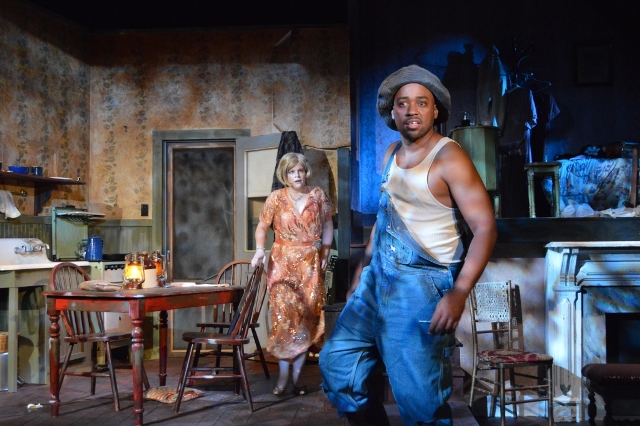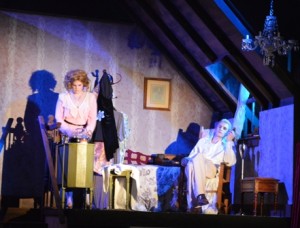Walking into the theatre of South Camden Theatre Company (SCTC) brings one to the dusty, isolated, threatening – and threatened – venue of an old farmhouse in the South of the 1960s. Capital “S” for South as this is southern, all southern, gothic southern, Tennessee Williams southern. KINGDOM OF EARTH is the sometimes title given to this rarely done play, and to say that Williams was wallowing in the southern gothic genre is understating the case. As usual with most SCTC productions, their KINGDOM OF EARTH challenges the actors, the production staff and the audience. This play demands one’s attention from the actors’ entrances and holds one firmly in its grasp until the breathless and complex end. Reinforced by bringing the cast in through the audience, director Connie Norwood, uses everything that SCTC has to offer to bring this classic to life.
The SCTC cast is solid. Lot, played by John Schultz, is a tortured soul returning home for one last painful reunion with both his history and his half-brother before his ephemeral existence ends. The physicality of tubercular breathlessness is terrifying and Schultz’s portrayal of this dying man was fascinating and horrifying to watch. His slow, painful movements while action took place elsewhere did not draw attention but did provide an omnipresent sense of impending death which permeates this production. Roderick Slocum, as Lot’s half brother, Chicken, was a steaming grotesque. Don’t misunderstand the usage of the word grotesque. It is a high compliment to Slocum as he combined animal magnetism and movement with a southern sense of genteel lethargy that made him seem like an animal ready to pounce. Norwood made a problematical decision to cast Slocum, a black actor, to play Chicken. Chicken is a role usually played by a darker complected white actor portraying Chicken with much more masculinity than the feminized character of Lot. The only time that this casting became questionable was in Act II when the racial interplay between Chicken and Lot’s new wife, Myrtle, climaxes. Williams wrote dialogue exploding the ugliness of racial bigotry and the senseless hatred toward interracial couples. When faced with both a black and a white actor, the audience had already made their decisions as to how they felt about the southern milieu that made these two brothers possible inside one dysfunctional family. In Act II the audience has to make some quick adjustments to reconcile what they are seeing with what is said. Norwood’s decision together with Slocum’s portrayal basically work, and this is the only time that any question about the casting choice arises. Myrtle, as played by Alissa Nessan, is a flighty and fearful grotesque of her own. While Nessan’s passions are not obvious in Act I as Nessan vacillates among her rose-colored memories, her childish treatment of Lot and her fear and loathing of Chicken, they rise front and center in Act II. Myrtle is torn between the solid future she desperately seeks from her marriage to the dying landed Lot and her lower class, animal approach to mutual sexual gratification with Chicken. Nessan’s performance lacks believability in her hysteria and at times her manipulation of both of these men, but she still competently portrays Myrtle as the maypole around which these brothers dance.
Norwood and Robert Bingaman (Set Design) created a dissolute southern gothic farmhouse from the shabby door facing the audience to the dilapidated, worn pieces of furniture and props. The sense of the macabre, the unrelenting heat and lost dreams are palpable. Lighting (Andrew Cowles and Ashley Reiter) and Costuming (Nicole De Rosa Lukaitis) supported the ambience of this production. While the Williams language constantly reminds the audience of the impending flood of rising waters slowly working its way to the farmhouse, the Sound design (Josh Wallenfels) might have considered providing a background of water sounds even making the floodwaters the fourth character. It would have added yet another level of pounding emotion.
KINGDOM OF EARTH is not well known and is seldom produced. There are reasons both inside the writing itself and outside with the swirling demons surrounding Tennessee Williams. It is not Williams’s best work, but SCTC does a fine job in challenging the audience to understand it and with this understanding to confront our own bigotries and hatreds.
KINGDOM OF EARTH
Written by Tennessee Williams
Directed by Connie Norwood
October 11 – 27, 2013
South Camden Theatre Company
400 Jasper Street
Camden, NJ 08104
1-866-811-4111
www.southcamdentheatre.org



